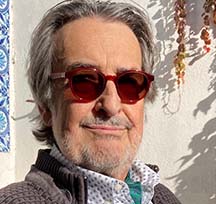 Por José Ramón Díaz-Torremocha
Por José Ramón Díaz-Torremocha
(Conferencias de San Vicente de Paúl en Guadalajara)
Email del autor: Esta dirección de correo electrónico está siendo protegida contra los robots de spam. Necesita tener JavaScript habilitado para poder verlo.
ATENCION: Al finalizar el artículo que sigue en español, está su traducción al inglés. Si algún lector deseara que se le enviaran estos artículos directamente a otro consocio o amigo, indíquelo como viene sucediendo a la dirección electrónica Esta dirección de correo electrónico está siendo protegida contra los robots de spam. Necesita tener JavaScript habilitado para poder verlo. facilitando la dirección electrónica del consocio o amigo. Al igual que aquellos que no quieran seguir recibiéndolos, indíquelo en la misma dirección de correo. Muchas gracias por su atención
YOUR ATTENTION: At the end of the following article in Spanish, there is a translation into English. If any reader wish that other fellow member or friend would receive these articles directly, please send a message as usual to Esta dirección de correo electrónico está siendo protegida contra los robots de spam. Necesita tener JavaScript habilitado para poder verlo., indicating their e-mail address. For, those who do not want to receive them anymore, please send a message to the same e-mail address. Thank you very much.
Lo observo con frecuencia y me entristece. Un día, hoy o hace cien años, uno o algunos cristianos tocados por el Espíritu Santo, por el “Orfebre de los Santos”, regalan al mundo y al Pueblo de Dios, el nacimiento de una obra cualquiera que sea pero que viene justificada por hacer el bien. Que viene a cubrir, la mayoría de las veces, una necesidad específica y que justifica por sí misma, el nacimiento de ese nuevo servicio Eclesial. De ese nuevo llevar a Cristo al mundo que nos rodea.
También a veces, la polvareda del camino que andamos, que anda ese nuevo regalo en forma de concurso para aliviar o servir a otros, el polvo que se nos adhiere va poco a poco, desviándonos de los objetivos fundacionales. De aquellos para los que nos soñaron. Los sucesores de aquellos fundadores desean aportar su propia visión y aumentar los objetivos o reformar las prioridades de la primera hora. Siempre con la mejor intención ¡faltaría más! Pero……… ¡no siempre se hace el bien, aunque se crea que se está haciendo! No siempre. A veces se propone frente a la propia filosofía de los primeros años.
Con más frecuencia que la debida y creo que todos sabemos y pondríamos ejemplos exactamente de lo contrario, de cómo nos olvidamos de practicar como básicos las aspiraciones de la primera hora y las cambiamos por otras más fáciles. Más llevaderas, más cómodas y frecuentemente menos exigentes para nosotros. Santa Teresa de Ávila es un buen ejemplo de cómo tuvo que rebelarse contra esas prácticas.
Unas prácticas que a veces, ni tan siquiera están entre los objetivos acordes con la filosofía del fundador o fundadores de la Obra en cuestión, o con su carisma, pero sí parece que son muy atractivos para “venderse”. Para vender que la obra en cuestión, se “moderniza”. Para venderse, a veces, añadiría venderse a sí mismos, los promotores de esos cambios tantas veces innecesarios y en contra del mismo espíritu fundacional.
Con frecuencia lo que hacemos es desvirtuarla. Es crear otra cosa y no siempre mejor que la anterior. Hay veces que dejamos lo bueno para simplemente optar por lo mediocre, pero que consideramos más visible.
Seamos conscientes de que en un mundo cada día más alejado de los conceptos morales básicos no digo ya de los religiosos, estos cambios lo que logran es hacernos menos útiles a la extensión del Reino y con frecuencia, nos alejan de la oración, la meditación de la Sagrada Escritura, de la lectura apropiada, de la búsqueda del buen consejo, por encontrar todo ello, “pasado de moda y casi inservible frente a la modernidad”. Olvidándonos con frecuencia de lo que nos ha enseñado siempre la Iglesia y como nos lo recuerda y enseña el Concilio Vaticano II en la “Lumen Gentium” (10):
“Los bautizados son consagrados como casa espiritual y sacerdocio santo por la regeneración y por la unción del Espíritu Santo, para que por medio de todas las obras del hombre cristiano ofrezcan sacrificios espirituales y anuncien las maravillas de quien los llamó de las tinieblas a la luz admirable (Cf. 1 Pe 2, 4-10). Por ello, todos los discípulos de Cristo, perseverando en la oración y alabanza a Dios (Cf. Act 2, 42.47), han de ofrecerse a sí mismos como hostia viva, santa y grata a Dios (cf. Rom., 12,1), han de dar testimonio de Cristo en todo lugar, y a quien se la pidiere, han de dar también razón de la esperanza que tienen en la vida eterna (Cf. 1 Pe 3, 15)”.
Roguemos y estemos siempre vigilantes para qué a estos peligros, no sucúmbanos nunca en las Conferencias ni en aquellas obras cuya filosofía católica, nos es grata.
Por María, siempre a Cristo con y por María.
MODERNISATIONS?
I often observe it and it saddens me. One day, today or a hundred years ago, one or a few Christians touched by the Holy Spirit, by the "Goldsmith of the Saints", give to the world and to the People of God, the creation of a work, whatever it may be, but which is motivated by doing good. Most of the time it meets a specific need and justifies in itself the birth of this new ecclesial service, of this new way of bringing Christ to the world around us.
Sometimes, too, the dust of the road we walk, that this new gift walks in the form of support to relieve or serve others, the dust that sticks to us, diverts us little by little from our foundational objectives. From those for which we were dreamed. The successors of those founders wish to bring their own vision and increase the objectives or reform the priorities of the first period. Always with the best intentions, of course! But ......... we do not always do good, even if we think we are doing it! Not always. Sometimes there are propositions against the very philosophy of the early years.
More often than we should, and I think we all know it and would give examples of exactly the opposite, how we forget to practice as fundamentals the aspirations of the first hour and replace them with easier ones. More bearable, more comfortable and often less demanding for us. Saint Teresa of Avila is a good example of how she had to rebel against such practices.
These practices are sometimes not even among the objectives in line with the philosophy of the founder or founders of the Work concerned, or with their charisma, but they do seem to be very attractive in order to "sell themselves". To sell that the work in question is "being modernized". I would add that sometimes the promoters of these changes seek to sell themselves. Changes that are so often unnecessary and contrary to the founding spirit itself.
Often what we do is to distort it. It is to create something else and not always better than the previous one. There are times when we leave aside the good simply to choose the mediocre, which we consider more visible.
Let us be aware that in a world increasingly distant from basic moral concepts, let alone religious ones, these changes make us less useful for the spread of the Kingdom and often move us away from prayer, meditation on the Holy Scripture, appropriate reading and the search for good advice. Because we find all this "out of fashion and almost useless in the face of modernity". We often forget what the Church has always taught us, and what the Second Vatican Council reminds us and teaches us in “Lumen Gentium” (10):
"The baptised are consecrated as a spiritual house and a holy priesthood by the regeneration and anointing of the Holy Spirit, so that through all the works of the Christian man they may offer spiritual sacrifices and proclaim the wonderful deeds of him who called them out of darkness into a wonderful light (cf. 1 Pet 2:4-10). Therefore, all Christ's disciples, persevering in their prayers and praise of God (cf. Acts 2:42,47), are to offer themselves as a living sacrifice, holy and acceptable to God (cf. Rom. 12:1). They are to bear witness to Christ everywhere and to those who ask them, they are also to give an account of their hope of eternal life (Cf. 1 Pe 3, 15)”.
Let us pray and be ever vigilant so that we never fall prey to these dangers in the Conferences or in those works whose Catholic philosophy is pleasing to us.
Through Mary, always to Christ with and through Mary.
(1) Vincentians pray that the Holy Spirit will guide them in their encounters with those who suffer and make them channels of the peace and joy of Christ (Rule S.S.V.P. art.

















